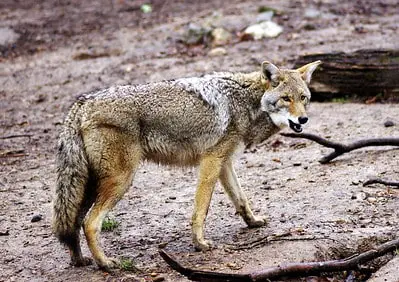Need to know what the laws are for hunting coyotes in Tennessee?
Tennessee keeps fighting for the right to hunt coyotes at night, but as of 2022, no luck. As Tennessee loses more livestock to coyotes, it relies on you, the coyote hunter, to make the difference. Learn all the laws below, and check for updates. You are responsible for adhering to any changes made.

Coyotes may be hunted year-round in Tennessee. Coyote hunters may not use any predator calls, electronic light to amplify night vision scopes, thermal imaging devices, or similar devices while possessing a firearm or archery tackle while hunting at night. There is no bag limit.
Purchase a license here.
Check out all the Tennessee hunting seasons.
Related: Read the rules for hunting fox in Tennessee.
Related: Learn the laws for hunting bobcats in Tennessee.
Related: What is the best time to hunt a coyote? Read the best hours of the day to call in a coyote.
Related: Read this article to learn how to hunt predators with a shotgun.
Rules for hunting coyotes in Tennessee.
With no night hunting option, you will have to master the craft of calling in what might be a well-fed, sleeping coyote.
Therefore the following articles are strongly recommended, especially for new predator hunters.
- 3 open reed coyote calls you can learn now.
- How to master the best closed reed coyote call.
- Coyote calling sounds your successful pals keep secret.
Check electronic predator caller prices here.
You need a different strategy for hunting coyotes in Tennessee during the day.
Let’s face it; coyotes move a lot more at night. The only way to increase your odds of success is to locate their habitat, find their dens, maximize the property you have, and get access to more property.
Locate their habitat.
- Learn how to track coyote sign here.
- Learn what coyotes eat throughout the year here.
Find a coyote’s den.
- Learn how to recognize and locate a coyote’s den here.
Maximize the property you already have access to.
- Don’t over hunt what you have already. Here are some tips to avoid over hunting a location.
- Learn how far you have to move between stands here.
Get more land to hunt coyotes on.
- Read here to discover 8 ways to get permission to hunt private property.
Hunting coyotes in Tennessee on farms and other private lands.
According to the Tennessee Farm Bureau:
“When you see a coyote on your property, it is legal to shoot and kill it in the state of Tennessee. If you are shooting it somewhere else for game, you will need to have your small game hunting license.”
Under Tennessee law, however, farmers are exempted from the license requirements.
This is called the ”Farmland Owner License Exemption.”
Persons hunting without a license under a resident farmland owner exemption must complete and sign a statement, attesting where the property is located and how this land qualifies for a landowner exemption.
Persons may complete the form in advance and carry it with them while hunting or they may complete the form when requested in the field by a TWRA official or when checking game. Resident landowners and their children hunting on their parent’s land under this exemption are also exempt from Hunter Education Certification requirements.
You will need a decoy, check coyote decoy prices here.
Did you know, all my predator hunting books are worthless for Tennessee predator hunters? That’s because they all deal with night hunting! But, you can other predator hunting books here.
You need written permission to hunt coyotes on private property in Tennessee?
In Tennessee, state wildlife laws require hunters and trappers to obtain permission from landowners to hunt or trap on private property.
In fact, it is advisable to get written permission to hunt and is required to trap. With the passage of TCA 70-4-106 in 1990, a “Hunting By Written Permission” law went into effect. Simply, the law states that if private land has been properly posted by the owner with signs that include their name and address plus the wording “HUNTING BY WRITTEN PERMISSION ONLY,” a hunter or trapper must carry the owner’s written permission. (Form available on Farmland Owner License Exemption Statement of this guide or at www.tnwildlife.org).
If a hunter or trapper is found without that written permission, that hunter or trapper is subject to prosecution.
Who needs a license for coyote hunting in Tennessee?
If you hunt game or attempt to hunt game by any method or if you assist someone else to do so, you must have a valid hunting license. There are some exceptions:
Residents born before March 1, 1926 (with proof of age and residency).
Military personnel on leave carrying leave papers.
Landowners, their spouses, and children who hunt on farmland which is owned by said landowners. The aforementioned must be residents of Tennessee but need not reside on the land. This license exemption does not apply if the farmland is owned jointly or in common by unrelated persons.
Resident grandchildren (under the age of 16) and resident great-grandchildren (under the age of 16) who hunt on farmland which is owned by their resident grandparents or great-grandparents.
Tenants, their spouses, and their dependent children who hunt on farmland owned by an individual or family. The aforementioned must be residents of Tennessee and must actually reside on the land and have the permission of the landowner to hunt. A tenant is a person who, for money, free rent, or other consideration, cares for farmland. The tenancy must be agricultural in nature.
First cousins who own farmland jointly or in common may fish and hunt small game on the farmland. Their children may fish and hunt small game as well.
Resident and nonresident youths under 13. Hunters ages 10-12 need only a hunter education certificate to hunt. However, youths 6-16 hunting big game on a WMA must have a valid Type 094 or Type 095 permit or quota permit, as applicable.
Hunting coyotes in Tennessee on WMA’s requires a permit.
Everyone who hunts on a Wildlife Management Area is required to have a WMA permit except the holder of a Lifetime Sportsman License, Annual Sportsman License, Annual Senior Citizen Permit (Type 167), and youths under age 16 hunting small game and waterfowl.
The youth hunters must be accompanied by an adult with a valid WMA permit. Youths under age 6 may not hunt big game on a WMA. All ages need a Type 094 permit for county non-quota hunts.
Related: Bears are predators too! Learn the basics of hunting a black bear here.
Related: Learn some tips to keep from ruining your entire trapline here.
The use of the following equipment is prohibited:
Predator calls while night hunting.
Pod arrows (any pod-type device for holding drugs or chemicals on an arrow) or any drugs or chemicals used in pod arrows while archery hunting.
Explosive arrowheads while archery hunting.
Firearms capable of fully automatic fire.
Firearms or archery equipment with any device utilizing an artificial light capable of locating wildlife.
Any electronic light amplifying night vision scope, thermal imaging device or similar devices while in possession of a firearm or archery tackle between sunset and sunrise.
Electronic calls or live decoys while hunting wild turkey, foxes, and waterfowl (except electronic calls are legal during the Conservation Season for Blue, Snow, and Ross’ geese).
Rifles or handguns with full metal jacketed ammunition.
Rifles or handguns with centerfire ammunition between 30 minutes after sunset and 30 minutes before sunrise.
Any loose shot other than non-toxic (as approved by U.S. Fishing and Wildlife Service) or any shotgun shell loaded with shot other than non-toxic while hunting waterfowl, coots, gallinules, Virginia rails, and sora rails.
Any firearm including air guns using archery bolts.
Tracer ammunition.
Hunting coyotes in Tennessee from vehicles and boats.
Where hunting is allowed from vessels, it is legal to hunt from any vessel, so long as the vessel is not under forward motion from any influence of mechanical means or sail. On private property, it is legal to hunt from any motorized vehicle (to include ATVs, golf carts, etc.), provided the vehicle is stationary.
Nothing in this subsection shall be construed as authorizing hunting from a vessel, automobile or other motor vehicle while under power. Nothing in this subsection permits hunting from or across a public road or right-of-way.
Coyote hunting in Tennessee: Near homes.
Hunting near private dwellings: It is unlawful to hunt, shoot at, chase, or kill with or without dogs any wild animal, wild birds, or waterfowl on public lands and waters within 100 yards of a visible dwelling house, without the owner’s permission, whether or not such a dwelling is on public or private lands.
Can you use a suppressor while hunting coyotes in Tennessee?
The use of suppressors/silencers is legal for persons possessing the required federal license from the United States Department of Treasury. Hunters using these devices must have proof of such license on their person.


